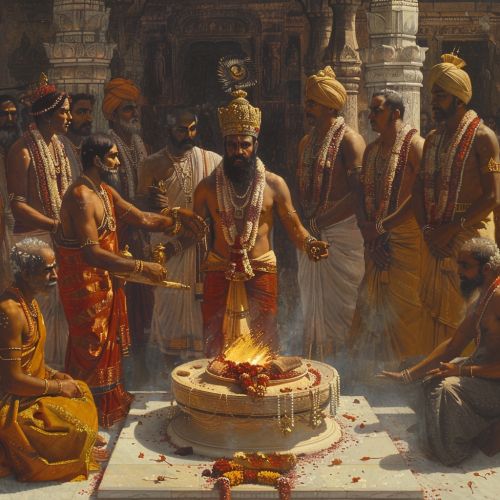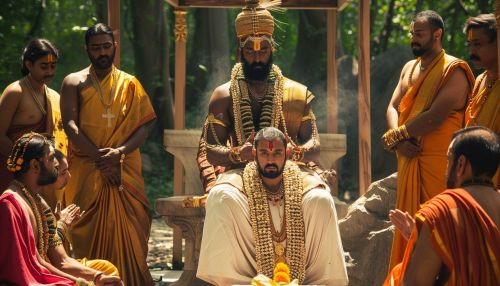Rajasuya
Rajasuya
The Rajasuya is a significant Vedic ritual of ancient India, primarily associated with the Kshatriya or warrior class. It is a royal consecration ceremony performed by a king to assert his sovereignty and establish his supreme authority over other rulers. This elaborate ritual is deeply embedded in the cultural and religious fabric of ancient Hindu society and is described in various texts, including the Mahabharata and the Puranas.


Historical Context
The Rajasuya ceremony dates back to the Vedic period, a time characterized by the composition of the Rigveda, the oldest of the Vedas. This era saw the establishment of various rituals and ceremonies that were integral to the socio-political and religious life of the people. The Rajasuya was one such ritual that symbolized the king's divine right to rule and his duty to uphold Dharma.
The ceremony is mentioned in several ancient texts, including the Shatapatha Brahmana and the Taittiriya Samhita, which provide detailed descriptions of the rituals and their significance. The Rajasuya is also prominently featured in the epic Mahabharata, where it is performed by the Pandava king Yudhishthira.
Ritual Significance
The Rajasuya is not merely a political assertion of power but also a deeply religious act. It involves a series of complex rituals that are intended to invoke the blessings of the gods and ensure the prosperity and stability of the kingdom. The ceremony begins with the king performing a Somayajna, a ritual offering of the sacred Soma juice to the gods.
The central part of the Rajasuya is the Abhisheka, or the anointing of the king. This involves the pouring of sacred water and other substances over the king's head by priests and other dignitaries. The anointing symbolizes the king's purification and his divine right to rule. The ceremony also includes the performance of various Yajnas, or sacrificial rituals, to appease the gods and seek their favor.
Political Implications
The Rajasuya had significant political implications in ancient India. By performing this ceremony, a king could assert his dominance over other rulers and establish his supremacy. The successful completion of the Rajasuya was a testament to the king's power, wealth, and ability to maintain order in his kingdom. It also served as a means of legitimizing his rule and securing the loyalty of his subjects and vassals.
The Rajasuya was often followed by the Ashvamedha, another grand Vedic ritual that involved the release of a consecrated horse to roam freely for a year. The horse's journey symbolized the king's dominion over the territories it traversed, and any ruler who challenged the horse's passage was considered a rebel and faced military action.
Rajasuya in the Mahabharata
The Rajasuya ceremony performed by Yudhishthira in the Mahabharata is one of the most detailed and celebrated accounts of this ritual. Yudhishthira, the eldest of the Pandavas, undertakes the Rajasuya to establish his authority and fulfill his duty as a Kshatriya king. The ceremony is described in great detail in the Sabha Parva (Book of the Assembly Hall) of the Mahabharata.
Yudhishthira's Rajasuya involves the participation of various kings and dignitaries from across the land, including his cousins, the Kauravas. The ceremony is marked by grand feasts, elaborate rituals, and the distribution of gifts to the attendees. The successful completion of the Rajasuya establishes Yudhishthira's supremacy and earns him the title of Samrat, or emperor.
Symbolism and Legacy
The Rajasuya ceremony holds deep symbolic significance in Hindu culture. It represents the ideal of kingship, where the ruler is seen as a protector and upholder of Dharma. The rituals associated with the Rajasuya emphasize the king's role as a mediator between the divine and the earthly realms, responsible for maintaining cosmic order and ensuring the well-being of his subjects.
The legacy of the Rajasuya continues to influence contemporary Hindu practices and beliefs. The concept of divine kingship and the importance of ritual purity and duty are still prevalent in modern Hinduism. The Rajasuya also serves as a reminder of the rich cultural and religious heritage of ancient India, highlighting the intricate relationship between politics, religion, and society.
